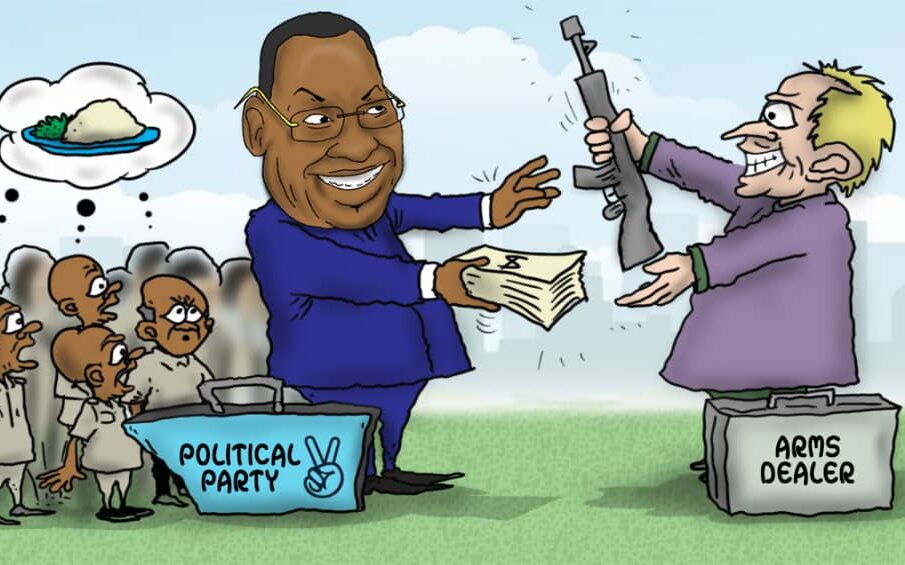
In global politics, violence, dissidence, and chaos are not merely acts of resistance but can be strategic tools for political parties to gain funding, exert influence, and attract international attention.
Particularly in developing regions like in Africa, some political parties have leveraged unrest to attract international funding and increase their standing. From Western governments to NGOs and other international bodies, the role of external actors in funding and fueling political violence is often masked but highly influential.
Foreign Influence on Political Movements
In many African countries, opposition parties have been accused of receiving clandestine support from foreign powers, often aiming to destabilize the ruling government. A real-world example is Zimbabwe, where opposition movements like the Movement for Democratic Change (MDC) have been accused by the ruling ZANU-PF of receiving support from the United States and the European Union to undermine President Robert Mugabe’s regime.
The following are key ways in which political parties, can leverage violence and chaos to secure funding and external support from various international actors.
NGOs as Political Agents
Non-governmental organizations (NGOs) often operate under the guise of development and humanitarian aid, but some are suspected of having deeper political motives. In South Sudan, for example, there have been claims that NGOs funded by Western countries indirectly supported rebel movements, fueling ongoing violence.
Similarly, in Venezuela, opposition parties were accused of receiving support from NGOs funded by U.S. aid organizations like the National Endowment for Democracy (NED), which has a history of supporting anti-government movements under the pretext of promoting democracy.
Embassies and Covert Funding
Foreign embassies have played covert roles in political unrest in many countries. In Ukraine during the 2014 Maidan Revolution, there were widespread allegations that the U.S. embassy provided substantial financial and logistical support to the opposition, which led to the ousting of President Yanukovych.
In this scenario, Western embassies could provide financial backing to political parties, along with intelligence and operational support, all aimed at keeping the ruling government under pressure while protecting their geopolitical interests.
Arms Dealers and Chaos as Business
International arms dealers thrive in conflict zones, and they often profit from both sides of the political spectrum. One real-world example is Libya during its civil war, where arms dealers from Eastern Europe and the Middle East sold weapons to various factions, including rebel forces backed by foreign governments.
Additionally, the arms trade in South Sudan’s civil war fueled ongoing violence as international dealers supplied weapons to both the government and opposition forces. This generates income for both the party and arms dealers, creating a mutually beneficial arrangement.
Media as a Tool for Influence
International media coverage can amplify violence, portraying opposition movements as heroic resistance against authoritarianism. One example is the coverage of Syria’s civil war, where Western media often framed the opposition as freedom fighters against the Assad regime, helping to attract global support and funding for these groups.
Similarly, in Myanmar’s Rohingya crisis, international media focused heavily on the government’s actions, generating global sympathy and funding for the opposition.
Financial Institutions and Their Role
International financial institutions like the IMF and World Bank have sometimes been accused of influencing political power through economic means. In Greece, for example, financial institutions were seen as leveraging the country’s debt crisis to impose austerity measures, which fueled widespread protests.
In Kenya, during the 2007-2008 post-election violence, the World Bank and IMF froze funds, indirectly increasing pressure on the government and its opponents. This, in turn, helps them maintain their destabilizing tactics against the government while securing financial leverage.
The Cycle of Violence and Funding
Violence, when strategically leveraged, can generate substantial financial and political capital. Real-life examples such as the Sudanese opposition during the 2019 uprising highlight how opposition movements can receive significant international support during periods of unrest.
Similarly, the Arab Spring saw international powers pouring money into opposition movements across North Africa and the Middle East, amplifying the chaos.
The intertwining of violence and politics is a complex game where financial backing often comes from external players with their own vested interests. For opposition parties in unstable political environments, leveraging violence and chaos becomes not only a strategy for gaining power but also for generating financial support.
As seen in various real-world examples, from Zimbabwe to Venezuela and Ukraine to Libya, political parties can attract funding from NGOs, foreign governments, arms dealers, and international institutions, all under the guise of fighting for democracy or human rights.
In this environment, violence is not just a tool of resistance—it is a profitable strategy that ensures continued financial backing, media attention, and political survival.















